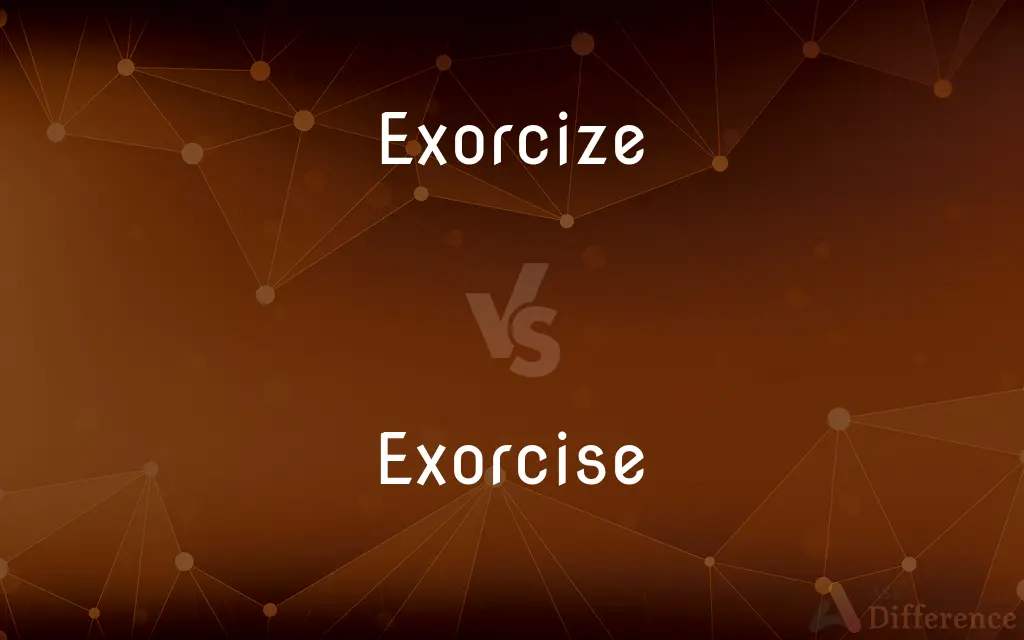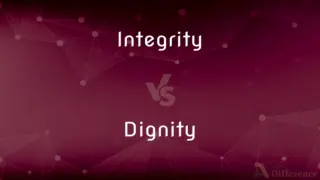Exorcize vs. Exorcise — What's the Difference?
Edited by Tayyaba Rehman — By Maham Liaqat — Updated on April 1, 2024
Exorcize and exorcise are variant spellings of the same term, referring to the act of driving out or attempting to drive out an evil spirit from a person or place.

Difference Between Exorcize and Exorcise
Table of Contents
ADVERTISEMENT
Key Differences
Both "exorcize" and "exorcise" describe the ritual or act aimed at expelling evil spirits or demons from individuals who are believed to be possessed or from locations thought to be haunted. The process typically involves specific prayers, commands, or rituals conducted by someone deemed to have the authority or power to command such spirits, often a religious figure like a priest or shaman.
Historically, the practice of exorcism has roots in various cultures and religions, signifying a universal recognition of the concept of spiritual or demonic possession across different societies. The term "exorcise" tends to be more commonly used in modern English, while "exorcize" appears less frequently but is still recognized as an alternative spelling.
The act of exorcising is not solely about the physical expulsion of a demon but also involves the purification and spiritual healing of the possessed individual or the sanctification of a place. It underscores a belief in the power of faith and sacred rites to overcome malevolent forces.
Exorcism rituals vary widely among different religions and sects, reflecting diverse theological and cultural understandings of evil spirits and how to deal with them. Regardless of the specific practices or beliefs involved, the goal remains consistent: to restore peace and spiritual health to the affected person or place.
The effectiveness and ethical considerations of exorcism are topics of debate, with opinions varying widely depending on religious beliefs, personal experiences, and scientific viewpoints. However, both terms—exorcize and exorcise—encapsulate the enduring human endeavor to confront and resolve manifestations of evil within the world.
ADVERTISEMENT
Comparison Chart
Spelling
Less common variant
More commonly used variant
Definition
To drive out evil spirits
To drive out evil spirits
Usage Context
Religious rituals, cultural practices
Religious rituals, cultural practices
Associated Figures
Priests, shamans, religious leaders
Priests, shamans, religious leaders
Cultural Perception
Same as exorcise
Same as exorcize
Compare with Definitions
Exorcize
The act of performing a religious or solemn ceremony to expel a demon.
They called upon a shaman to exorcise the spirit.
Exorcise
The process of seeking spiritual cleansing and protection.
The family underwent a ritual to exorcize their home of unwelcome spirits.
Exorcize
Use of prayers or commands to free someone from demonic possession.
The ancient text contained words used to exorcize evil entities.
Exorcise
To deliver or purify from the influence of an evil spirit or demon.
Exorcise the beds and cross the walls.
Exorcize
To drive out evil spirits from a person or place.
The priest performed a ritual to exorcize the haunted house.
Exorcise
Ritualistic practice aimed at purifying a person or place from evil influences.
The community gathered for a ceremony to exorcise the negative energies.
Exorcize
(transitive) To drive out supposed evil spirits from a person, place or thing, especially by an incantation or prayer.
Exorcise
Expel through adjuration or prayers;
Exorcise evil spirits
Exorcize
(transitive) To rid a person, place or thing of an evil spirit.
Exorcise
To expel (an evil spirit), as by incantation, command, or prayer.
Exorcize
Expel through adjuration or prayers;
Exorcise evil spirits
Exorcise
To eliminate or suppress (a malign influence or negative feeling, for example)
"the man most Americans now loved to like as they exorcised the defeatist spirit of the 1960s" (Gil Troy).
Exorcise
To free from or rid of an evil spirit, malign influence, or other harmful factor
"Kaiser Wilhelm II's puritanical wife ... sent her personal chaplain to exorcise the palace rooms Leopold had been staying in" (Adam Hochschild).
Exorcise
(transitive) To drive out (an evil spirit) from a person, place or thing, especially by an incantation or prayer.
Exorcise
(transitive) To rid (a person, place or thing) of an evil spirit.
Exorcise
To cast out, as a devil, evil spirits, etc., by conjuration or summoning by a holy name, or by certain ceremonies; to expel (a demon) or to conjure (a demon) to depart out of a person possessed by one.
He impudently excorciseth devils in the church.
Common Curiosities
Why is exorcise more common than exorcize?
"Exorcise" has become the preferred spelling in modern English usage, though the reasons for this preference are largely historical and arbitrary.
Do exorcisms always involve physical rituals?
Not always; some exorcisms may be performed through prayer or spoken commands without physical rituals.
Are exorcize and exorcise interchangeable?
Yes, they are variant spellings of the same word and can be used interchangeably.
Is exorcism recognized by all religions?
Many religions recognize the concept of exorcism, but the beliefs, methods, and acceptance of exorcism vary widely among different faiths.
Can exorcism be found in non-religious contexts?
While primarily a religious practice, elements of exorcism have been adapted into secular contexts, often within cultural or therapeutic practices.
Can anyone perform an exorcism?
Traditionally, exorcisms are performed by individuals with specific religious authority or spiritual knowledge, though practices vary by culture and religion.
How does modern society view exorcism?
Views on exorcism in modern society are mixed, ranging from skepticism to belief, often influenced by religious faith, personal experiences, and cultural background.
Has the practice of exorcism changed over time?
While the core concept remains, the practice of exorcism has evolved, reflecting changes in religious doctrines, societal attitudes, and understanding of psychology.
Can exorcism be performed on places as well as people?
Yes, exorcism can be aimed at cleansing places believed to be haunted or influenced by evil spirits, as well as freeing individuals from possession.
Can exorcism be self-administered?
Some belief systems may support self-exorcism through prayer or personal rituals, though traditionally, it involves a designated spiritual authority.
Are there risks associated with exorcism?
Critics argue that exorcism can pose psychological or physical risks, especially when performed without regard to the individual's mental and physical health.
What is the historical origin of exorcism?
Exorcism practices can be traced back to ancient civilizations, where they were integrated into religious and cultural rituals to combat perceived evil forces.
How do movies and literature portray exorcism?
Portrayals vary, with some works treating exorcism with seriousness and respect, while others lean towards sensationalism or horror.
What role does faith play in exorcism?
Faith is a central element, as exorcism is rooted in the belief in spiritual authority over evil entities, regardless of the specific religious context.
How do different cultures perform exorcism?
Exorcism rituals vary greatly across cultures, incorporating unique prayers, symbols, and practices specific to each tradition's understanding of the spiritual world.
Share Your Discovery

Previous Comparison
Integrity vs. Dignity
Next Comparison
Butler vs. HousekeeperAuthor Spotlight
Written by
Maham LiaqatEdited by
Tayyaba RehmanTayyaba Rehman is a distinguished writer, currently serving as a primary contributor to askdifference.com. As a researcher in semantics and etymology, Tayyaba's passion for the complexity of languages and their distinctions has found a perfect home on the platform. Tayyaba delves into the intricacies of language, distinguishing between commonly confused words and phrases, thereby providing clarity for readers worldwide.
















































